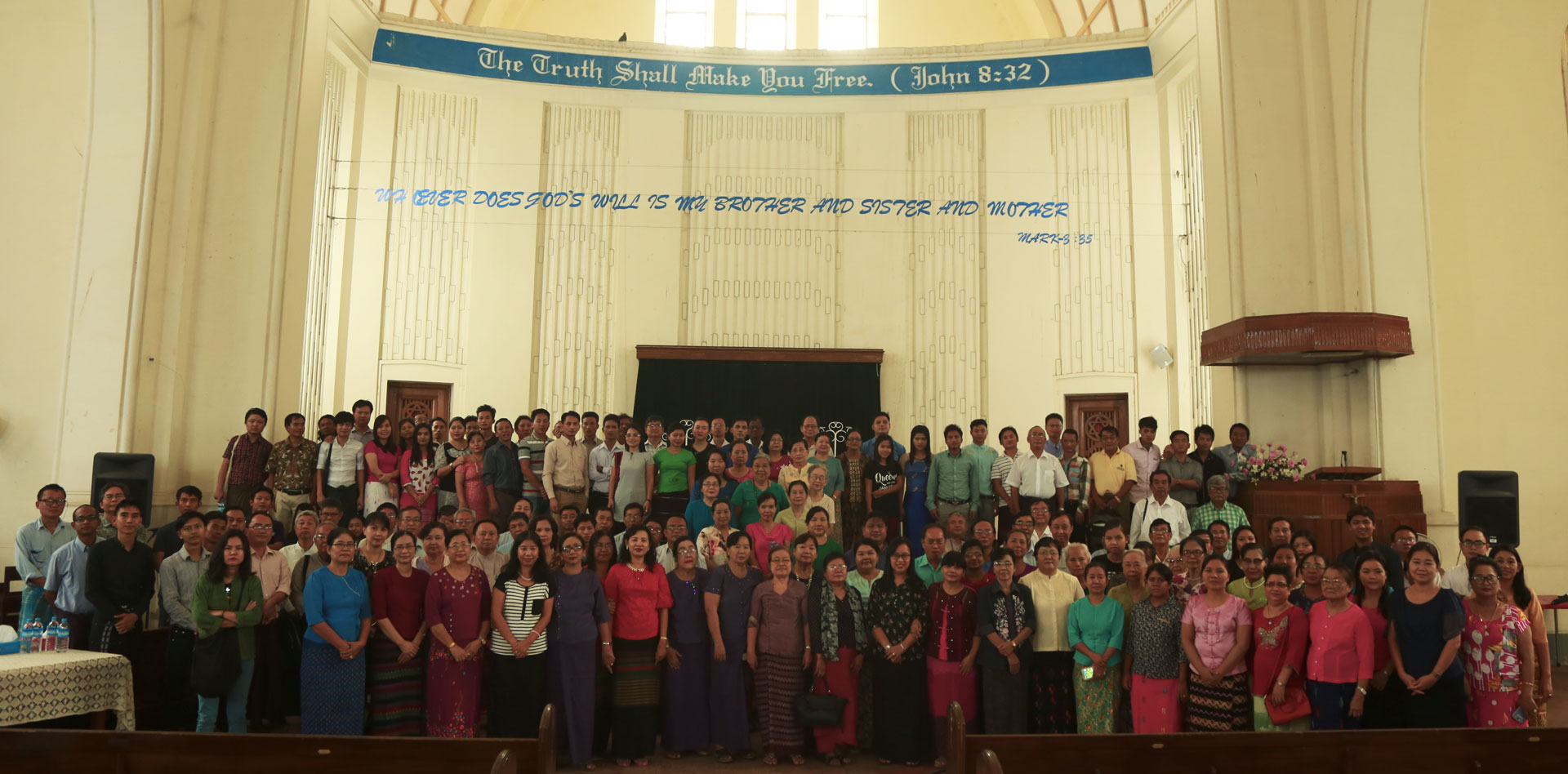Myanmar churches call for envisioning the relevance of Mission in the context of wider ecumenism
 Participants of the Myanmar churches consultation on AMC theme.
Participants of the Myanmar churches consultation on AMC theme.
As the churches in Myanmar are engaged in intensive preparations for hosting the Asia Mission Conference (AMC) and the Diamond Jubilee commemoration of the Christian Conference Asia (CCA) from 11 to 17 October, more than 200 theologians, missiologists, theological educators and church leaders met together and reflected on the theme of the AMC in Myanmar's context.
The participants gathered in Yangon on 26 August at the invitation of the Myanmar Council of Churches (MCC) for a one-day consultation on the theme of AMC, stated, “Christians in Myanmar need to journey together with a common vision, and to build a common platform for effectively participating in God’s mission of wider ecumenism. Positive transformations in areas of social, political, economic, and religious realms need to take place in order to be engaged in prophetic witnessing to the Truth and Light, with the guidance of the Holy Spirit."
While analysing the proposed Mission Statement of the Asia Mission Conference, the participants opined that, “churches in Myanmar will have to envision new mission paradigm with a new vision in Myanmar, as well as in Asia”.
“A new understanding of prophetic accompaniment will enrich theological undergirding of mission. The prophetic witness and mission of Jesus who identified with the poor, the captive, the oppressed, challenge Myanmar churches to go beyond the parameters of their traditional missiological paradigm. The traditional missional paradigm, which is understood in Myanmar even today, is a concept that mission is for converting or proselytising. The churches in Myanmar must go beyond these traditional perceptions on Mission,” echoed the participants as they tried to respond to the draft of the Mission Statement which will be finalised and adopted at the Asia Mission Conference.
In discussions on “Affirming the Servanthood”, participants observed a shift from the traditional understanding of servanthood to ‘challenge to the hierarchical structure of society’ is a new understanding of servanthood in Myanmar's context. The churches in Myanmar never understood servanthood as challenging the hierarchical structure of society. In fact, the traditional understanding is to obey and be silent rather than challenging. It is, therefore, a new and radical understanding of affirming the servanthood as Mission, in Myanmar's situation.”
“Participating in the Reign of God”, was discussed in the light of ‘to see as God sees, to judge as God judges, to love as God loves’. The participation of Myanmar churches in the reign of God has been found inadequate, but the attempt to provide relocation for the internally displaced people in Myanmar may be one of the ways of participating in the reign of God as God is the God of the poor. Out of several ways, this has been understood as one of the ways to participate in the reign of God.”
As to the areas of mission concerns, participants discussed to what extent are the churches going to be prophetic on social, political, economic, religious and ecological issues. They observed that, “Myanmar is not free from ecological problems, and awareness in ecological issue is urgently needed. The government is also trying its best to conserve the land, the forests, and natural resources of Myanmar. The Church must participate in the efforts of the Government in ecological conservation so that they may heal the ecological wounds in Myanmar.”
Due to conflicts, violence, and climate, Myanmar has encountered ‘People on the Move’ in a large scale during the past decades which has displaced people internally. The participants found the Churches may not have the capacity to embrace the strangers. However, it is necessary to widen the scope of our mission. Today, the impact of globalization both positive and negative, have been challenging issues in Myanmar, where the rich become richer and the poor become poorer similar to other Asian countries. In this situation, economic justice is crucial but the strength of the churches seems inadequate to stand against or to transform the negative impacts of globalization”.
“As to the religious intolerance, Myanmar is not free from religionization of politics and politicization of religion. Regarding these issues, it is discussed that the Myanmar churches must be free from religionization of politics and politicization of religion, encouraging interfaith dialogues and peaceful co-existence of all religions”
The participants discussed and hoped that peace will be the best mission paradigm in the 21st century not only in Myanmar and Asia, but also all over the world.
The AMC to be held at the headquarters of the Myanmar Baptist Convention (MBC) with the participation of 400 representatives from Asian and global churches.
Rev. Saw Shwe Lin, coordinator of the AMC local committees stated that the representatives of various churches attended the consultation affirmed the hope of the churches in Myanmar that the AMC will facilitate a platform for Asian Churches to engage in journeying together for prophetic witness to the Truth and Light, bringing positive transformations in social, political, economic, religious and ecological arenas in Asia”.
The Diamond Jubilee commemoration will be held on Sunday 15 October with the participation of specially invited guests from Asian and global churches as well as 5000 representatives of churches from all over Myanmar.










